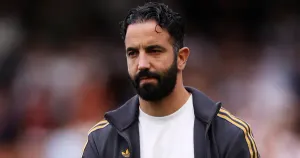The Arrival... Hope Meets Curiosity: When Rúben Amorim stepped into Old Trafford in November 2024, fans dared to dream. Sporting Lisbon’s tactical prodigy promised structure, discipline, and a modern attacking blueprint. But in England, ideas collide with reality—and the Premier League rarely forgives rigidity.
🚨🔴 BREAKING: Manchester United are set to pay €10m exit clause for Rúben Amorim to become new manager, here we go!
— Fabrizio Romano (@FabrizioRomano) October 29, 2024
Sporting confirm formal communication received from #MUFC for Amorim to be appointed.
Amorim has already said yes to Man Utd proposal and project. pic.twitter.com/v17tR1oqlm
Early Sparks, Rapid Fade
A 4-0 demolition of Everton. A derby triumph at Man City. Early flashes suggested United might finally find clarity under Amorim. But within months, the façade cracked. By January 2025, following a shocking defeat to Brighton, Amorim admitted the squad might be “probably the worst in the history” of the club. United limped to a 15th-place finish, equalling their Premier League low.
Tactical Rigidity: Elegance or Prison?
Amorim’s 3-4-3 system is neat on paper: controlling the midfield, pushing wing-backs forward, and orchestrating attacks with precision. In practice? Critics argue it strangles creativity. Danny Murphy warned the system stifles players like Bruno Fernandes and Kobbie Mainoo, leaving the midfield predictable and easy to exploit. Minor tweaks—shifting to a back-four or varying presses—offer some relief, but the core philosophy remains rigid, a potential trap for a league that punishes inflexibility.
🗣"Why they brought in somebody with such a rigid system when they're not prepared to bring in the players to fit that system."
— Off The Ball (@offtheball) March 2, 2025
🗣"He is rigid but they knew that."
How do the holes get filled at Manchester United under Ruben Amorim?
The Sunday Paper Review pic.twitter.com/oDNM1EM5Xb
Signs of Promise, Yet Fragile
The 2025–26 season brings glimmers of hope. United dominate the expected goals charts and generate attacking danger. But inconsistency persists. A humiliating Carabao Cup exit to League Two’s Grimsby Town starkly illustrated the risks of inflexibility. Rumors swirl around players like André Onana, highlighting misalignment between system and squad.
The 2028 Premier League Dream: Can Amorim Deliver?
Manchester United’s Project 150 is clear: reclaim the Premier League by 2028. Strategic planning, financial backing, and high-profile signings are all part of the blueprint. But here’s the tension: Amorim’s rigidity may limit the adaptability necessary to meet this ambitious timeline. Even with the perfect squad, a predictable system risks being solved by savvy opponents. The question: can a manager known for sticking to his principles evolve fast enough to match United’s audacious goal?
Back the Wrong Horse?
United face a stark choice: continue backing a manager whose tactical philosophy is unproven in England and whose early tenure has delivered mixed results—or cut losses before financial, reputational, and timeline costs spiral. In a compressed timeline to 2028, patience may be a luxury the club cannot afford.
Potential vs. Pragmatism: The Amorim Dilemma
Amorim’s tenure embodies football’s classic tension: visionary structure versus practical adaptability. Flashes of brilliance hint at what could be, but rigidity risks limiting United’s trajectory. For a club obsessed with reclaiming Premier League glory, success demands evolution, not stubbornness. The coming months will decide if Amorim can bend without breaking—or if his gamble will leave Old Trafford chasing dreams it can no longer reach.



